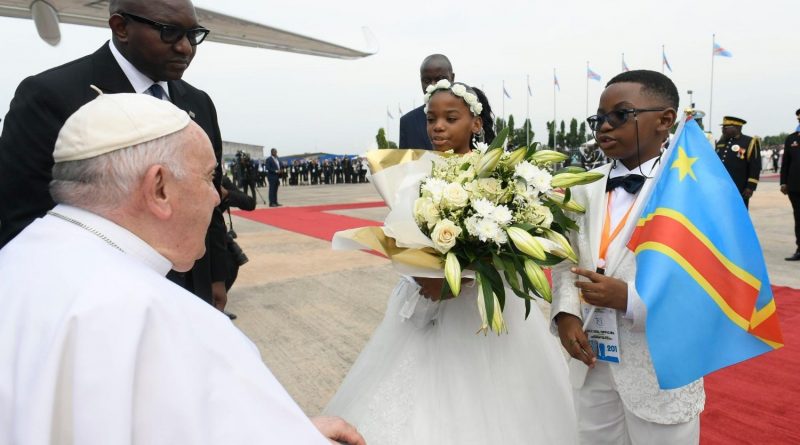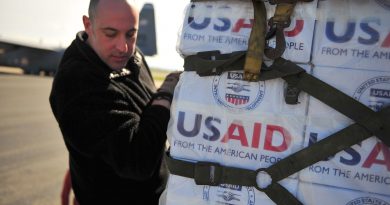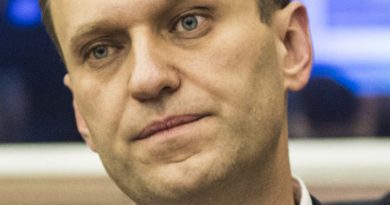Pope Francis Visits DR Congo on Historic Trip to Africa
Charlotte Sens
Staff Writer
On Tuesday, January 31, Pope Francis arrived in Kinshasa, the capital of the Democratic Republic of the Congo, to begin his six-day visit to the African country, according to the Associated Press. The Pope was greeted by roaring crowds as he left Ndolo airport, as the majority Catholic nation received its first papal visit since Pope John Paul II in 1985, reports Al Jazeera. This is Pope Francis’ fortieth trip abroad and his fifth to Africa since he was elected to the Papacy in 2013. After he arrived in the nation’s capital, the pope and his motorcade were followed by thousands as he made his way to Kinshasa’s national palace. There, he gave a speech to Congolese officials and the diplomatic corps. In his speech he condemned western nations’ economic involvement in the region, calling for them to stop carving up the nation and acknowledge the role they are playing in the economic enslavement of the Congolese people, exclaiming “Hands off the Democratic Republic of the Congo! Hands off Africa!”
Pope Francis’ visit comes at a critical time as he hopes to reinvigorate the flow of donations to the region as the war in Ukraine distracts many people from struggles elsewhere, reports Al Jazeera. The pope wanted to bring attention to the ongoing instability and poverty in both the Democratic Republic of the Congo and South Sudan, reminding the world that they should not turn a blind eye to these conflicts even as they disappear from the nightly news.
The DRC has been in a state of ongoing conflict as more than 100 para-military groups are active in the nation’s east, including the M23 rebel group and militants linked to the Islamic State. This conflict has displaced up to 5.7 million people, with up to a fifth of this number fleeing just last year. DRC president Felix Tshisekedi said that he hopes the Pope’s presence will draw greater attention to the nation as he accused the international community of ignoring the pain and suffering of his people. He once again claimed that neighboring Rwanda continues to support M23 rebels, a claim that Rwanda has denied, and that it has taken part in the economic exploitation of the nation. Pope Francis had planned to travel to Goma, the capital city of North Kivu, a hot spot of rebel activity; however, fighting had grown too intense for him to make the journey. He will instead meet with a delegation of citizens from the eastern DRC at the Vatican embassy in Kinshasa, where they will participate in a ceremony and promise to forgive their assailants.
South Sudan experienced widespread instability and poverty after its split from the Republic of Sudan in 2011 and civil war in 2013. The people of South Sudan continue to experience conflict and insecurity as parts of the civil war’s 2018 peace agreement have yet to be implemented. Roughly 2.2 million South Sudanese have been internally displaced due to the violence while another 2.3 million people have fled the country. More recently, the United Nations cut food aid to the nation due to a lack of funding as international attention turned toward the war in Ukraine. It is expected that roughly 7.76 million of the country’s 10.75 million people will experience acute food shortages, according to the UN.
The Pope’s visit also indicates that the Catholic church is at a turning point. The Conversation reports that Pope Francis convened a worldwide consultation on the future of the Catholic church, known as a synodal process, which began in 2021 and which will conclude in 2024. Through this process, the Pope will hear from members of the church across the world, letting his congregation voice what changes must be made to the institution.
This process has revealed issues surrounding women’s rights, celibacy, sexuality, marriage, clericalism, and hierarchism. This arises as the number of Catholics in the West continues to dwindle. For this reason, NPR reports that the church has identified Africa as the future of Catholicism, as it is the only continent where membership in the church continues to rise. This places the church in a position to be a driver of social, political, and spiritual life on the continent. In fact, the Catholic church runs about 60 percent of health and education services in the DRC, cementing itself as a central figure in Congolese society.
Throughout his trip, Pope Francis met with many African Catholics, political leaders, youths, women, and impoverished people. On Wednesday, February 1, Pope Francis performed a mass at Kinshasa airport to a crowd of a reported 1 million people, according to NPR, where he continued to speak out against violence in the region. Pope Francis stayed in the Democratic Republic of the Congo until February 3, then visited South Sudan until his departure on February 5, returning to Rome.
Image courtesy of Vatican News



